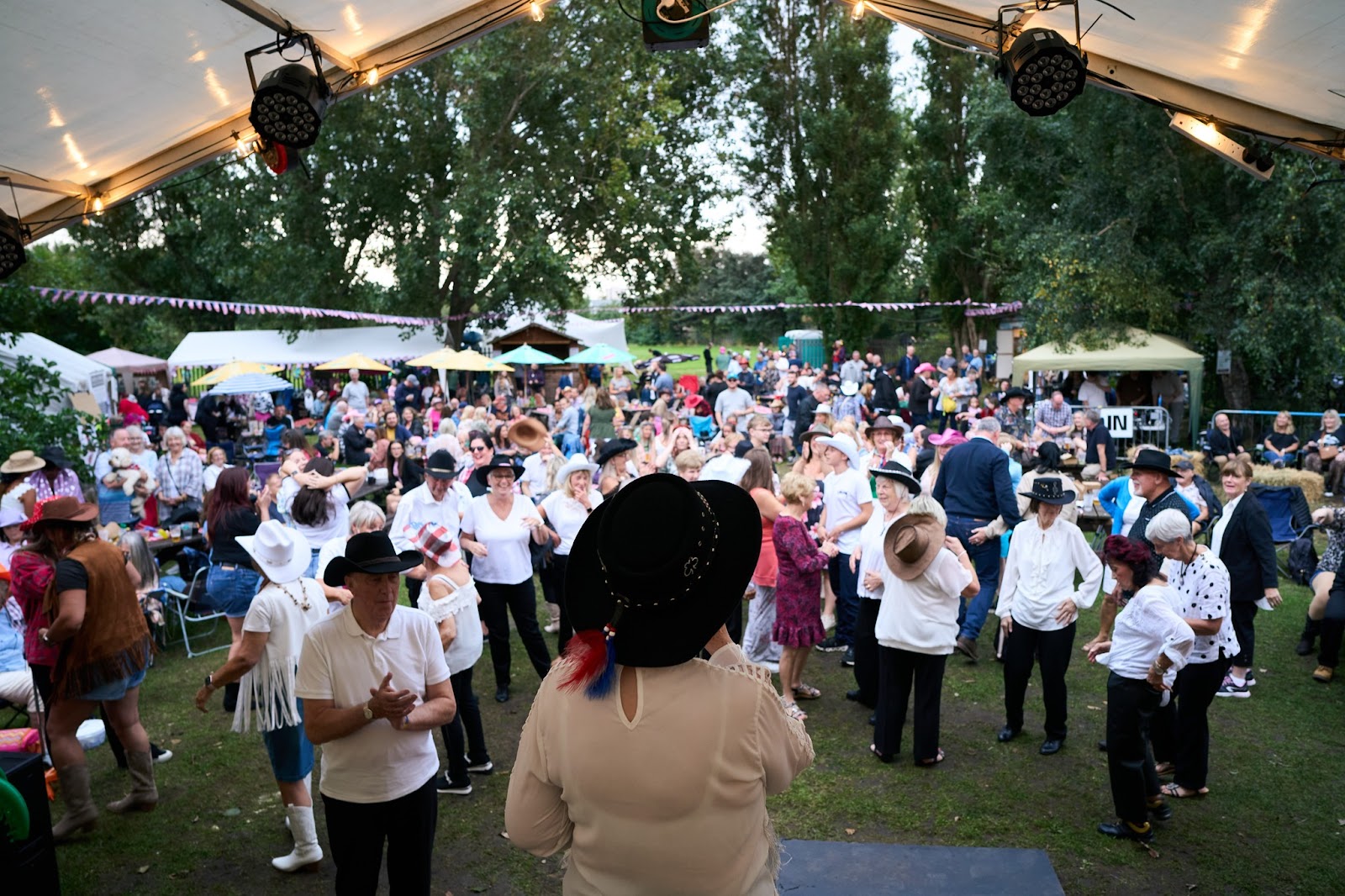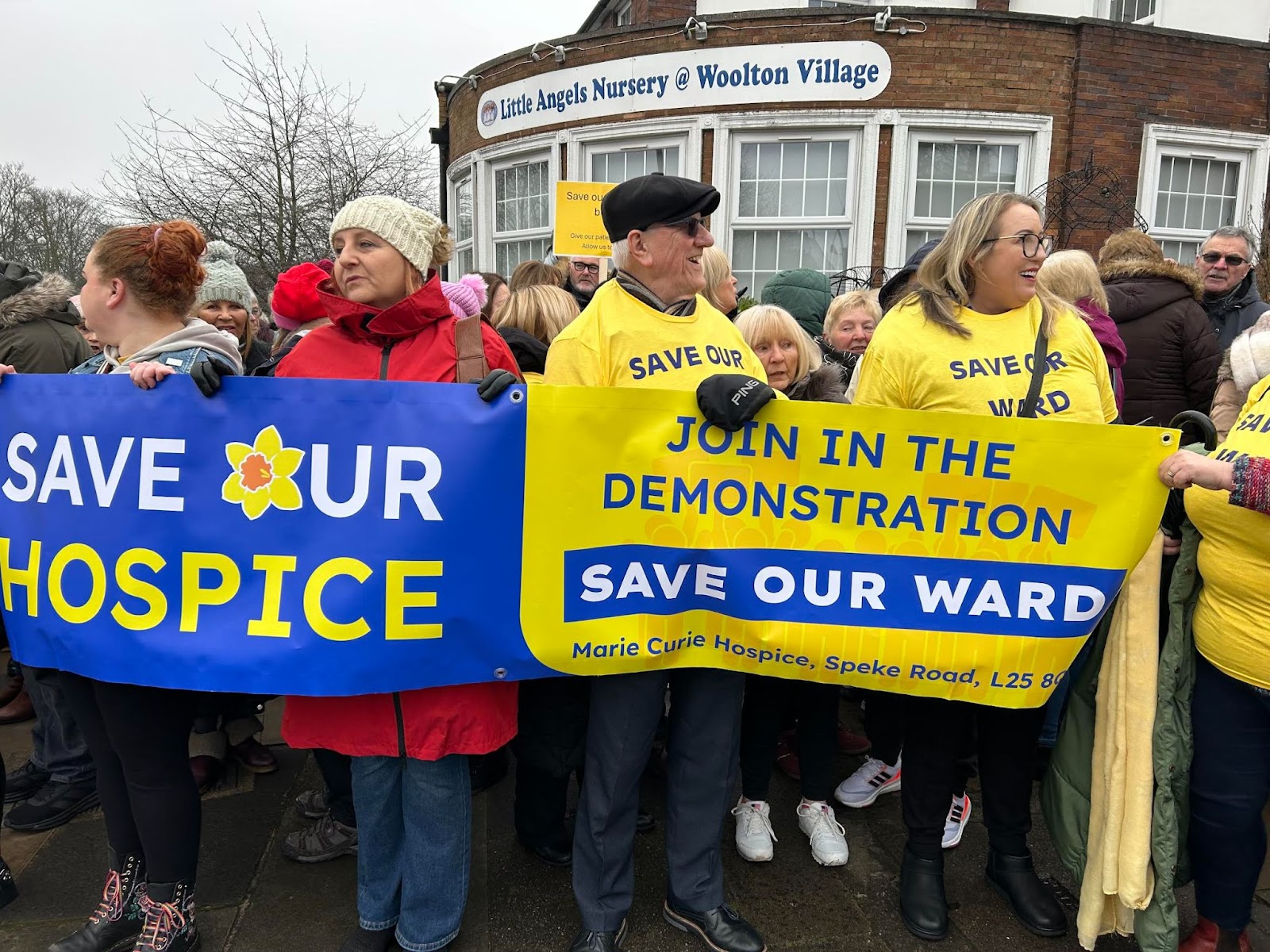The fight to save Marie Curie’s inpatient unit, accolades for a Bootle pub
Plus: your weekly roundup and some great things to do this week
Dear readers – We hope you’ve all had a fabulous weekend. Welcome to your Monday briefing.
Today’s big story: we dig into why hundreds of people – including current and former staff, family members of former patients, and councillors across the political spectrum – all gathered this past Saturday for a vigil calling for the reopening of the inpatient ward at Marie Curie hospice in Woolton. Can community support help the beleaguered organisation get back on its feet?
We’ve also got some good news for the only community-run pub in the region, an update on last year’s reporting into some dodgy property goings-on, and great things to do this week.
Editor’s note: We’re so thankful to all of you who have joined us as paid members over the past couple of weeks. Over here at Post HQ, we’re working hard on follow ups to some of our recent investigations, as well as pursuing fresh leads; these projects take time, effort and — crucially — money. We’re almost entirely reader-funded, which is why we can spend significant lengths of time on thoroughly reported and well-written stories rather than churning out clickbait filler. For those of you who haven’t yet taken out a paid subscription, there’s never been a better time to join us. If you value what we do, please join today.
Your Post Briefing
A Merseyside property boss is a convicted conman who previously hid his criminal past behind a new identity, the BBC reports. Turns out, Scott El Paraiso of the Liverpool-based firm Urban Evolution Property Management got jail time in 2009 for defrauding £25,000 from pensioners while working as a plumber under his birth name, Adam Minett. The Post reported on Urban Evolution Property last year, when the company threatened Toxeth tenants with “unethical” convictions. El Paraiso’s business partner then threatened to sue us, boasting “I have read Aristotle’s Ethics from front to back”. As of today, The Post has yet to hear from this litigious philosopher's legal representatives.
Pupils at West Kirby Grammar School on the Wirral have been informed that the Latin language will cease to be taught after the end of the next academic year. The news comes after the Department for Education announced that from this month it will be terminating its Latin Excellence Programme, which taught Latin to over 5,000 pupils, as part of a cost-saving measure. That cutback followed a government review that suggested museum and theatre trips and other “high-brow pursuits” should be replaced to avoid “middle-class bias” in the curriculum. “Latin has been taught as a subject at West Kirby Grammar School since it came into being and the school has a history of producing passionate students,” says the Change.org petition attempting to reverse the decision. The Post spoke to a father of two pupils at the school, both of whom were “devastated” by the news.
And a hearty congratulations to the Lock and Quay in Bootle, which has made it through to the finals of a prestigious national pub award. The only community-owned pub in the region was nominated by SAFE regeneration partnerships director, Jane Dawe, in the Community Support category for PubAid’s Community Pub Hero Awards. On making it to the finals, Dawe mentioned that the pub is celebrating its tenth year as a “thriving hub where people meet to play music, paddle canoes, sing, debate, connect and foster ideas. The huge gardens host monthly community festivals — something for everyone. The Lock is very special — we are NOT a community centre, but we ARE the centre of our community and to be a finalist in these awards means so much to our small, dedicated team — especially in our anniversary year!”

Big story: Marie Curie will be “met with the wrath of Liverpool” if it can’t revive its Woolton hospice
Top line: Marie Curie temporarily closed its doors last summer due to staff shortages, and the inpatient unit remains closed. Can community pressure help turn things around?
Context: Last year, the people of Liverpool rallied to save a hospice in existential difficulty. Zoe’s Place, which cares for babies and young children, was saved from imminent closure after more than £6m was raised on its behalf in just a month’s time. That amount was made up of donations from Home Bargains, sportswear firm Montirex, celebrities like Robbie Fowler, and members of the local community.
As successful as that campaign was, its success highlighted the ways in which other hospices in the area struggling to stay open haven’t been so lucky. Marie Curie, the 26-bed hospice in Woolton, which provides palliative care and support for terminal patients, temporarily shut in July amid shortages in specialised nursing staff. With the city’s attention diverted elsewhere, no comparable cause célèbre was made.

While outpatients continue to be cared for, earlier this month, the Liverpool hospice’s staff were informed that the inpatient unit had no future.
The first Marie Curie hospital – named for the scientist who conducted pioneering research on radioactivity – opened in north London in 1930, treating female cancer patients using radiology. After that building was irreparably damaged during the Blitz, a re-establishment committee set up the Marie Curie charity in 1948, separating themselves from the brand-new NHS. The Woolton branch first opened its doors in 1959 and has maintained a presence in the city ever since.
But the reality of austerity Britain has taken its toll on hospices. By 2016/17, two thirds in England reported that their state funding had been frozen or cut, with 80% saying they were more reliant on charitable giving. Meanwhile, according to a joint study by Pro Bono Economics and Nottingham Business School, austerity led to a 23% drop in charity income from local governments.
Five years ago, more than half of Liverpool-based charities told a Charities Aid Foundation (CAF) poll that they would no longer be sustainable within a year. Separate polling by the Small Charities Coalition (SCC) revealed that around the same proportion had not received any government support as of September 2020. Last year, Hospice UK highlighted that a fifth of hospices were cutting services amid the worst funding crisis in two decades, with an estimated shortfall of £60m in the current financial year.

Despite being the largest charitable employer of palliative nurses in the UK, the Marie Curie organisation is totally reliant on donations. This is the context in which the hospice has tried to maintain its inpatient and outpatient services, which aims to ensure that both residents and day patients can access doctors, social workers, chaplains, occupational therapists, bereavement counsellors, and physiotherapists. The daily cost of running the Woolton hospice is around £9,000.
Earlier this month, Maria Eagle, the Labour MP for Garston, met with Marie Curie’s CEO Matthew Reed. Eagle told BBC Radio Merseyside that the charity has said it was "considering all options when it comes to the Woolton Hospice and that includes not reopening the inpatient services".
Since then, Woolton and Liverpool more broadly have started to rally.
"This community isn't going to let the inpatient unit go quietly,” said Lucy Williams, a Liverpool Community Independents councillor for Garston and herself a specialist palliative care nurse at the hospice for two years. “We're not going to allow vital services to be stripped back and stay silent.”
This weekend, hundreds of people attended a protest against the hospice’s potential closure. On Saturday, attendees held placards of loved ones who had been cared for at the Woolton site. Williams told the BBC that "Marie Curie are going to be met with the wrath of Liverpool” if the charity did not address the inpatient unit’s uncertain future, confirming supporters would march to the organisation’s London headquarters if necessary.
Bottom line: Despite imaginative fundraising initiatives by healthcare assistants, the generosity of donors, and the fierce passion of local councillors and campaigners, the stark reality is that hospices like Marie Curie cannot continue to survive on donations alone. There aren’t just patients to consider, but the staff who work tirelessly to deliver much-needed services. At the very least, they deserve definite answers from Marie Curie’s leaders regarding their careers and the future of the unit. And if hospices are to continue to play a vital role in British public life more generally, as The Post argued back in November, a more sustainable funding model must be found.
Photo of the week

West Indian youths climb the wall surrounding the Anglican cemetery near the Cathedral following a meeting for the Young Panthers.
Post Picks
⛓️On Wednesday, Jacaranda Records presents a live performance from Punk Rock Factory in support of their new album 'All Hands on Deck'. Tickets here.
🍹On Thursday, Revolution at Albert Dock is hosting a mixed-ages singles night – free drink with entry if you arrive before 7:30. Tickets here.
🎷On Friday, Kenny Thomas brings his "Behind The Groove" clubnight to The Dome at Grand Central Hall. Tickets here.
🕺🏾And Prince tribute band Endorphinmachine has been performing since 2005, making them one of the longest-established Prince tribute bands the world over. They’re coming to the O2 this Saturday; tickets here.
Recommended Reads
Evertonian Alexandra Topping made a final pilgrimage with her nine-year-old son to Goodison Park for this lovely remembrance of the iconic stadium in the Guardian.

Comments
Latest
'The cleverest man in England' was from Liverpool. Did it hold him back?
Why are Merseyside’s state-of-the-art hydrogen buses stuck in a yard outside Sheffield?
I was searching for my identity in a bowl of scouse, and looking in the wrong place
The Pool of Life
The fight to save Marie Curie’s inpatient unit, accolades for a Bootle pub
Plus: your weekly roundup and some great things to do this week